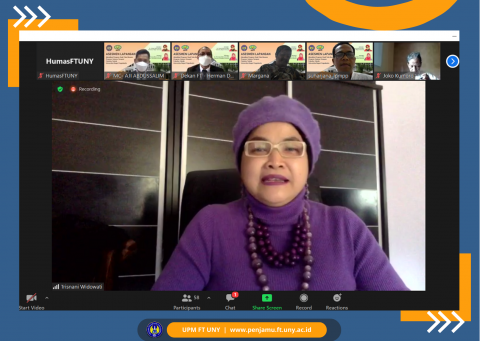Field Assessment of the Applied Clothier Study Program (D4)

Penjamu FT UNY - The Bachelor of Applied Dressmaking Study Program (D4), Faculty of Engineering, Yogyakarta State University, underwent an online field assessment (AL) process with representatives of the National Accreditation Board for Higher Education (BAN-PT) for accreditation assessment on Friday and Saturday (October 29 and 30, 2021). The BAN-PT assessors on duty at the Navy are Dr. Trisnani Widowati, M.Si., from Semarang State University, and Dr. Elis Endang Nikmawati, M.Sc., from the Indonesian University of Education. AL began with remarks by the Chancellor of Yogyakarta State University (UNY), which in this case were delivered by the Deputy Chancellor for Academic Affairs, Prof. Dr. Margana, M.Hum., M.A.
Margana believes that AL activities can provide positive input to advance the service quality of the Applied Undergraduate Fashion Engineering Study Program. "We continue to be committed to advancing vocational education, one of which is according to the direction of the Directorate General of Vocational Studies, where management will gradually be centralized at the Wates and Gunungkidul campuses by encouraging the realization of the triple helix, namely an innovation model that involves academia, industry, and government to foster economic and social development," he said.
"We continue to involve the business world and the industrial world (DUDI) in the development of applied undergraduate study programs to ensure maximum transfer of knowledge so as to increase the link and match between the quality of graduates and industry needs," added the UNY Deputy Chancellor for Academic Affairs.
"In fact, we also continue to encourage the creation of hexa-helix collaborative relationships between the government, private sector, intellectuals, creative communities, media, and investors in the spirit of developing applied undergraduate study programs to ensure our graduates get careers according to their expertise," he explained.
"They also continue to be provided with entrepreneurial skills so that in the future they will not only become job seekers but more job creators," added Margana.
"Therefore, we continue to encourage the composition of learning in Applied Bachelors to be more dominant in practice, up to 70%," continued the Professor of Linguistics.
Meanwhile, Trisnani Widowati said in her remarks that UNY had progressed and developed very rapidly, one of the proofs being the existence of this Applied Undergraduate Study Program. He also said that in the two days of the assessment process, there would be more reviews and sharing in an effort to confirm the data that had been sent.
In line with this, Elis Endang Nikmawati expressed her hope that over the next two days they could share experiences with each other for the progress of the Applied Bachelor of Fashion Study Program (D4).
Dean of the UNY Faculty of Engineering, Prof. Herman Dwi Surjono, Ph.D., emphasized in his presentation that the Bachelor of Applied Fashion Design Study Program (D4) is a development of (D3) Fashion Engineering based on the attachment to the letter from the Ministry of Research, Technology, and Higher Education No. B/185/C. Ca/KB.01.00/2019 concerning the assignment of changes in Diploma III study programs to applied bachelors in higher education to strengthen vocational education levels against future industrial challenges.
After the opening, the event then continued with the process of verifying Forms III A and III B for the faculty and study program. There are seven standards that are reviewed as the basis for assessment, including (1) vision, mission, goals, and objectives, and achievement strategies; (2) governance, leadership, management systems, and quality assurance; (3) students and graduates; (4) resources—human resources; (5) curriculum, learning, and academic atmosphere; (6) financing, facilities, and infrastructure; and (7) research, service/community service, and cooperation. All stages of this activity are very relevant to the implementation of UNY's sustainable development goals in the field of quality education.
